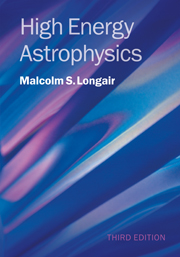Book contents
- Frontmatter
- Contents
- Preface
- Acknowledgements
- Part I Astronomical background
- Part II Physical processes
- 5 Ionisation losses
- 6 Radiation of accelerated charged particles and bremsstrahlung of electrons
- 7 The dynamics of charged particles in magnetic fields
- 8 Synchrotron radiation
- 9 Interactions of high energy photons
- 10 Nuclear interactions
- 11 Aspects of plasma physics and magnetohydrodynamics
- Part III High energy astrophysics in our Galaxy
- Part IV Extragalactic high energy astrophysics
- Appendix: Astronomical conventions and nomenclature
- Bibliography
- Name index
- Object index
- Index
5 - Ionisation losses
from Part II - Physical processes
Published online by Cambridge University Press: 05 June 2012
- Frontmatter
- Contents
- Preface
- Acknowledgements
- Part I Astronomical background
- Part II Physical processes
- 5 Ionisation losses
- 6 Radiation of accelerated charged particles and bremsstrahlung of electrons
- 7 The dynamics of charged particles in magnetic fields
- 8 Synchrotron radiation
- 9 Interactions of high energy photons
- 10 Nuclear interactions
- 11 Aspects of plasma physics and magnetohydrodynamics
- Part III High energy astrophysics in our Galaxy
- Part IV Extragalactic high energy astrophysics
- Appendix: Astronomical conventions and nomenclature
- Bibliography
- Name index
- Object index
- Index
Summary
Introduction
When high energy particles pass through a solid, liquid or gas, they can cause considerable wreckage to the constituent atoms, molecules and nuclei. Specifically, they cause:
(i) the ionisation and excitation of the atoms and molecules of the material. In the process of ionisation, electrons are torn off atoms by the electrostatic forces between the charged high energy particle and the electrons. This is not only a source of ionisation but also a source of heating of the material because of the transfer of kinetic energy to the electrons;
(ii) the destruction of crystal structures and molecular chains;
(iii) nuclear interactions between the high energy particles and the nuclei of the atoms of the material.
In this chapter we will be principally concerned with the first of these processes, ionisation losses, which are important in a number of different contexts. They influence the propagation of high energy particles under cosmic conditions and the associated energy losses provide an effective mechanism for heating the interstellar gas, for example, in giant molecular clouds. Equally important is the use of the ionisation losses of high energy particles in particle detectors – these provide a means of identifying the properties of the particles as well as providing a measure of their incident fluxes upon the detector.
There is a pedagogical reason for beginning with ionisation losses. From the astrophysical perspective, ionisation losses provide an example of the procedures which have to be followed in working out the various ways in which high energy particles interact with matter.
- Type
- Chapter
- Information
- High Energy Astrophysics , pp. 131 - 153Publisher: Cambridge University PressPrint publication year: 2011



